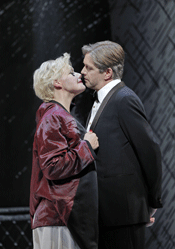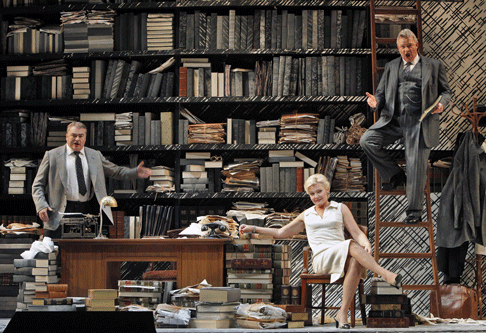20 Nov 2010
The Makropulos Case in San Francisco
Just now in San Francisco Finnish soprano Karita Mattila kicked ass as Janáček’s 337 year old Elina Makropulos.*

Just now in San Francisco Finnish soprano Karita Mattila kicked ass as Janáček’s 337 year old Elina Makropulos.*
Specifically she kicked the asses of the several men who materialized in her long, long life just as the effects of the longevity potion her father invented back in 1593 began to wear off. These unfortunate men had awakened those few moments when, over the centuries, her soul had been moved, and these rediscovered feelings conflicted with her instinct for eternal life as she had come to understand over the centuries the futility of her emotions. She finds resolution of this conflict in death.
This bizarre masterpiece is, all said and done, Janáček’s idea of a comedy. His uniquely middle European depressive poetic, melding philosophy with highly complex emotions took solid hold into the reaches of War Memorial Opera House by its third performance (November 17).
Universally vivid performances. Elina’s great, great, great, etc., grandson Berti sung by Slovakian tenor Miro Dvorsky touched the true tonalities of the Czech language, the Prus of German bass-baritone Gerd Grochowski found the suavity and confidence of an Austro-Hungarian aristocracy, the fumbling lawyer Dr. Kolenaty was enacted skillfully by stalwart San Franciscan buffo Dale Travis.
 Karita Mattila as Emilia Marty and Gerd Grochowski as Jaroslav Prus
Karita Mattila as Emilia Marty and Gerd Grochowski as Jaroslav Prus
Touching were the performances of Adler alumni Thomas Gleen as Vitek and Brian Jagde as Janek, the callow young victim of Elina’s perfected sexual prowess. Adler alumnus Matthew O’Neill was caricatural pure perfection as Elina’s idiot lover Hauk, as was Kristina, the opera-star-to-be (Elina Makropulos’ protege) sung by Susannah Biller.
Dominating the stage equally were Janacek’s heroine Karita Mattila as Elina Makropulos and Janáček’s orchestra conducted by Jiří Bělohlávek. They were simply one and the same, one soprano embodying Mo. Bělohlávek’s seventy-three players. Yes, the performance was huge. She was huge, the enormity of 337 years of life graphically unravelling on the stage was quite real.
The story of Elina Makropulos is told musically rather than dramatically, the little lawsuit Gregor vs. Prus merely pretext for the inner life of Mme. Makropulos to explode in the orchestra, superseding the dramatic inconsistencies and general confusion of the libretto.
Mme. Mattila absorbed every musical movement in a dramatic performance so complete that it will become legendary as it traverses the world. For this she has partnered with conductor Bělohlávek who revealed the gamut of the depraved humanity Janáček had transformed into pure music in his preceding oeuvre. Like all Janáček heroines Elina Makropulos too attains a sort of salvation by reconciling herself to the futility of life and therefore accepting death.
 Miro Dvorsky as Albert Gregor, Karita Mattila as Emilia Marty and Dale Travis as Dr. Kolenatý
Miro Dvorsky as Albert Gregor, Karita Mattila as Emilia Marty and Dale Travis as Dr. Kolenatý
The production by Viennese director Olivier Tambosi merely supported the Mattila performance, the stylishly directed supporting cast moving appropriately over the turntable set imagined by big-time designer Frank Philipp Schlössmann. Like the staging the set disappeared behind the Mattila performance. Its cartoon lines were self-consciously descriptive of a caricatural concept that the production flirted with but never fully absorbed. Maintaining this careful balance of caricature and expressionist comedy was however the strength of the production, allowing at least some perspective for the over-the-top Mattila performance.
*“Let’s kick ass” was Mme. Mattila’s term before attacking Salome last year on the Met’s Live in HD.
Michael Milenski